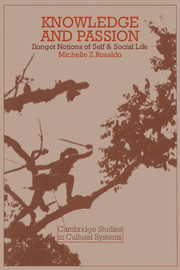Book contents
- Frontmatter
- Contents
- Preface
- Acknowledgments
- 1 The Ilongots
- 2 Knowledge, passion, and the heart
- 3 Knowledge, identity, and order in an egalitarian world
- 4 Horticulture, hunting, and the ‘height’ of men's hearts
- 5 Headhunting: a tale of ‘fathers,’ ‘brothers,’ and ‘sons’
- 6 Negotiating anger: oratory and the knowledge of adults
- 7 Conclusion: Self and social life
- Appendix 1 Ilongot phonology
- Appendix 2 Glossary
- Notes
- Bibliography
- Index
7 - Conclusion: Self and social life
Published online by Cambridge University Press: 05 June 2012
- Frontmatter
- Contents
- Preface
- Acknowledgments
- 1 The Ilongots
- 2 Knowledge, passion, and the heart
- 3 Knowledge, identity, and order in an egalitarian world
- 4 Horticulture, hunting, and the ‘height’ of men's hearts
- 5 Headhunting: a tale of ‘fathers,’ ‘brothers,’ and ‘sons’
- 6 Negotiating anger: oratory and the knowledge of adults
- 7 Conclusion: Self and social life
- Appendix 1 Ilongot phonology
- Appendix 2 Glossary
- Notes
- Bibliography
- Index
Summary
Interpretive ethnography is, to use Riceour's phrase, a matter of attributing “a meaning to a meaning” (1970: 13). It is a descriptive enterprise, which promises neither to uncover “how it feels” to get inside a native's skin nor to facilitate causal generalization, but rather through its organization to promote at once a taste for detail and a sense of pattern and to articulate something about the ways that cultures work by showing how they “mean.” By asking what could be called “strategic questions,” the anthropologist hopes to convey something of how – in general terms – distinctive cultural preoccupations inform as they are structured by the social lives of actors, and so enhance our ways of thinking about societies whose modes of discourse and relation are both similar to and different from, the complex particularities she describes. In this sense, all interpretation is, of necessity, comparative. We understand another's speech with reference to our construal of its context; and the ethnographer's constant challenge is to order – and so make sense of – foreign discourse in a way that manages to preserve the “otherness” and complexity of unfamiliar “worlds” or contexts, while rendering familiar a hitherto inaccessible form of talk.
Of course, any description that attempts to synthesize, or make sense, makes claims about the nature of connection – and mine has argued that a discourse that concerns the experiences of “the self” is patterned less by universal psychic traits than by such local “forms of life” as make for relationship and opposition in societies.
- Type
- Chapter
- Information
- Knowledge and Passion , pp. 221 - 234Publisher: Cambridge University PressPrint publication year: 1980

